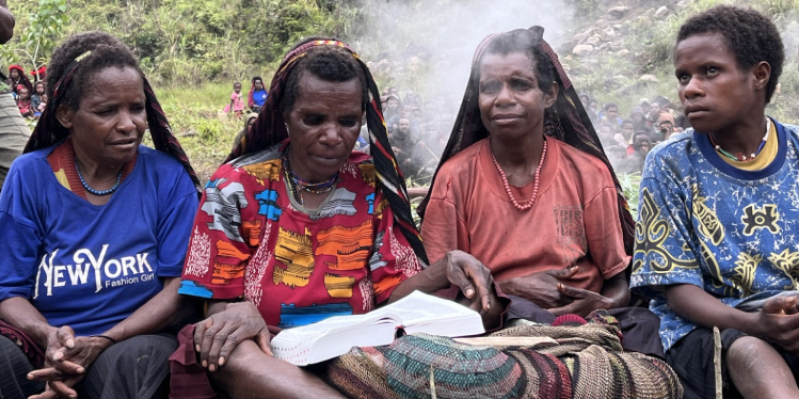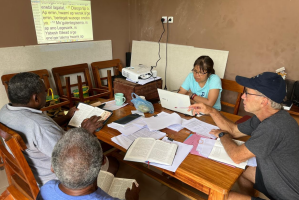
A small tribe in the Papua Province in Indonesia have a reason to celebrate following the release of the first complete Ngalik Bible that took nearly 50 years of laborious work done by three generations of missionaries and across two continents.
An endeavor that was started by missionary couple Ed and Shirley Maxey and continued through their son Buzz and his wife Myrna has brought the good news to the unreached people of Ngalik this year. Ed and Shirley made contact with the Ngalik people of Papua, Indonesia in 1960.
Their goal was to bring Scripture in the Ngalik language also called Silimo to this unreached community of approximately 8,500 people. Nearly 10 years later, the scripture translation work began, but they could not complete it.
When Shirley was on her deathbed in 2010, she shared one regret: not finishing the full Ngalik Bible. She asked if Buzz would speak with Ngalik church leaders about completing the project.
"We took that back to the tribe, to the leaders there, and they said, 'We're committed to doing it,'" Buzz recalled. "And I said, 'Let's do it together.'"
The Ngalik New Testament was completed in 1992 by Ed and Shirley Maxey. Now, 65 years after first contact, the complete Ngalik Bible has been launched. The region where the Ngalik live is difficult to reach. Getting there requires days of hiking or taking risky flights in unpredictable weather. Despite these obstacles, missionaries dedicated their lives to completing the translation.
Mission Aviation Fellowship (MAF) supported the work by providing air transport for translators and supplies, helping maintain access to the remote region throughout the decades-long effort.
Buzz and Myrna worked on the translation for nearly 25 years with the help from two Ngalik translators, Amos and Enos. For the first eight years, handwritten translations of the Old Testament were transported out of the Papua jungle to Canada. Canadian volunteers typed each verse, and the copies were taken back to Amos and Enos for corrections.
The effort spanned nearly half a century and involved three generations of missionaries. "You can't mess this up, this is the Word of God!" Buzz said.
Religious and political hurdles
While the completion of the Ngalik Bible marks a spiritual triumph for one of the small tribes, it unfolds against a more complex backdrop across Indonesia’s easternmost provinces. Beyond the mountains of Highland Papua, part of Indonesia’s easternmost region of New Guinea, faith and identity remain intertwined with deep social and political tensions.
While the area is roughly 70 percent Christian, the rest of Indonesia is predominantly Muslim. It is the world’s largest Muslim-majority nation.
Reports of forced conversions to Islam and other religious and human rights abuses regularly emerge from Papua. The region has also faced political turmoil. The Free Papua Movement (OPM – Organisasi Papua Merdeka) and other Papuan groups have long opposed Jakarta’s control — some demanding full independence, while others seek greater regional autonomy within Indonesia.
In June this year, Christian leaders and human rights activists urged the Indonesian government to halt military operations and end the ongoing conflict with rebel groups in Papua, warning that the violence has created a humanitarian emergency.

"Stop the military operations that kill God's people. Stop the military operations in civilian areas," the ecumenical group Papuan Council of Churches said in a statement.
The landscape of the Papua province is also changing through the transmigration efforts aimed to depopulate congested areas in Indonesia and resettle them to other parts, including areas in Papua.
Impact on the community
Yet amid these struggles, the Ngalik story offers a glimpse of hope. Far from the headlines of conflict and policy debates, the arrival of the full Bible has transformed daily life in the Silimo Valley, renewing faith and unity within the community.
The Ngalik people can now read, sing, and share Scripture in their own heart language. Children will grow up hearing Bible stories in their mother tongue, MAF said in a statement. Pastors can preach from the complete Bible. The community views this as a celebration of both their cultural identity and their faith.
According to MAF, significant work remains in the region. In 2026, survey flights will begin along the Mamberamo and Roufaer rivers to reach more unreached tribes, where amphibious aircraft are the only option.
Indonesia's Papua region is home to 278 languages, but only 10 have the complete Bible. Hundreds of communities are still waiting.
Canadian missionaries Ellya and Breanna Assa bring the story full circle, picking up where the first two missionary couples left. Ellya was born in Papua into a pastoral and missionary family that worked alongside MAF for more than 30 years.
"These encounters with MAF created within him a passion to serve in mission aviation," he explains. After training as a pilot and serving with MAF in Indonesia, Ellya and Breanna now serve as MAF Canada Ministry Ambassadors. Their role is to tell these stories, mobilize prayer, and inspire support so more tribes can receive God's Word.
Breanna shares the same vision of a lifelong call to missions and a deep love for the people of Indonesia. Together, they remind Canadian supporters that every Bible delivered and every flight flown is part of a larger mission.
"God doesn't just want some of His children to hear His voice—He wants all of them to know His Word. To be able to open the Bible and understand it in the language of their heart," Breanna says.
Speaking about Pentecost, Breanna said God could have used one language that day, but He didn't. He chose many. "Because from the very beginning, He wanted everyone to know: 'I see you. I speak your language. I love you.'"





